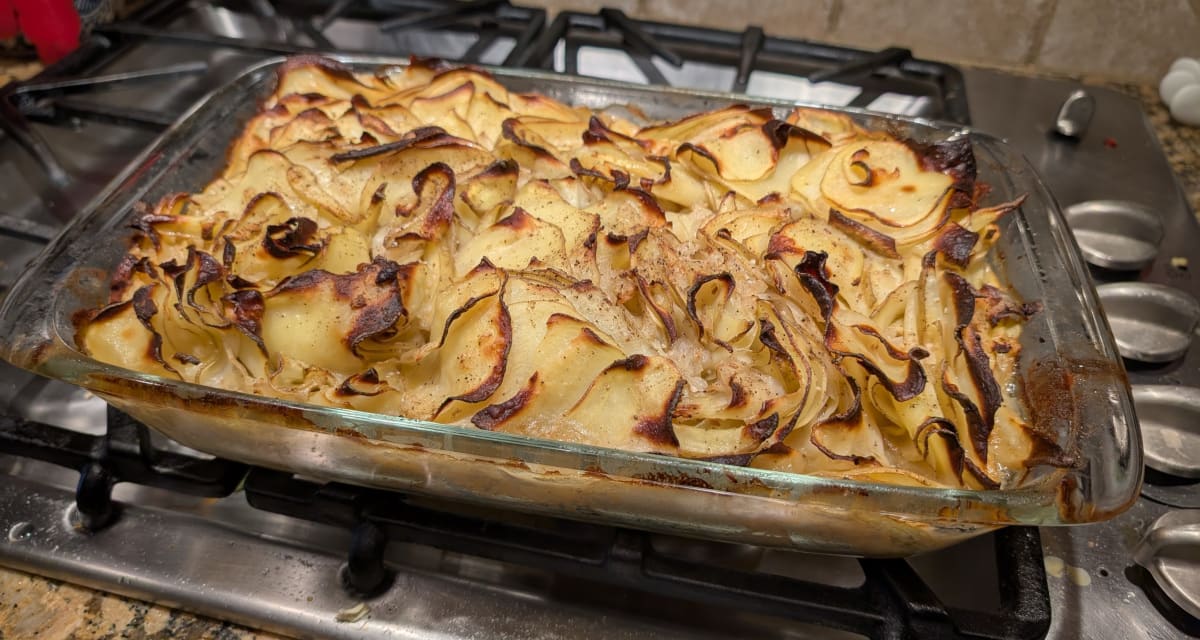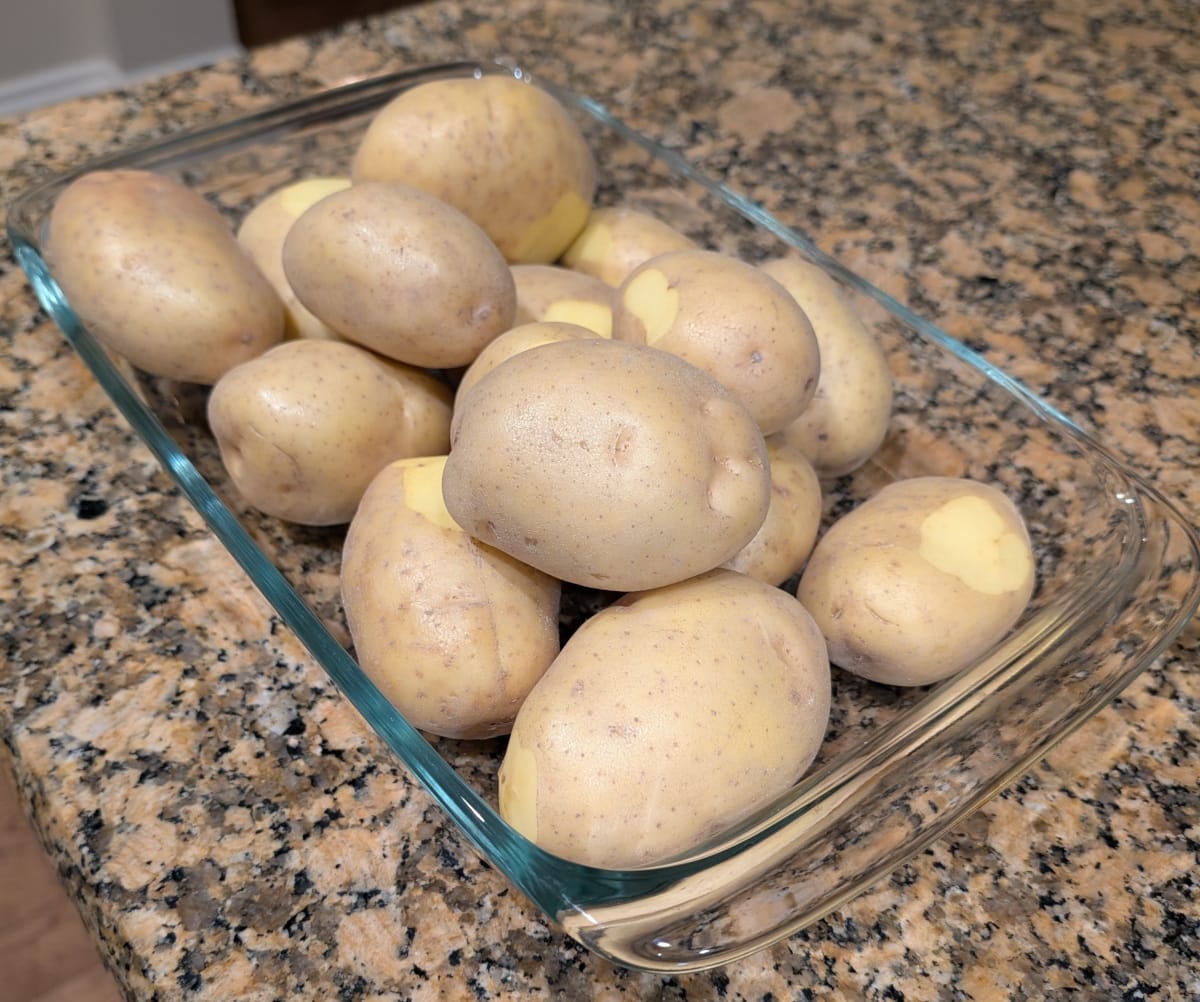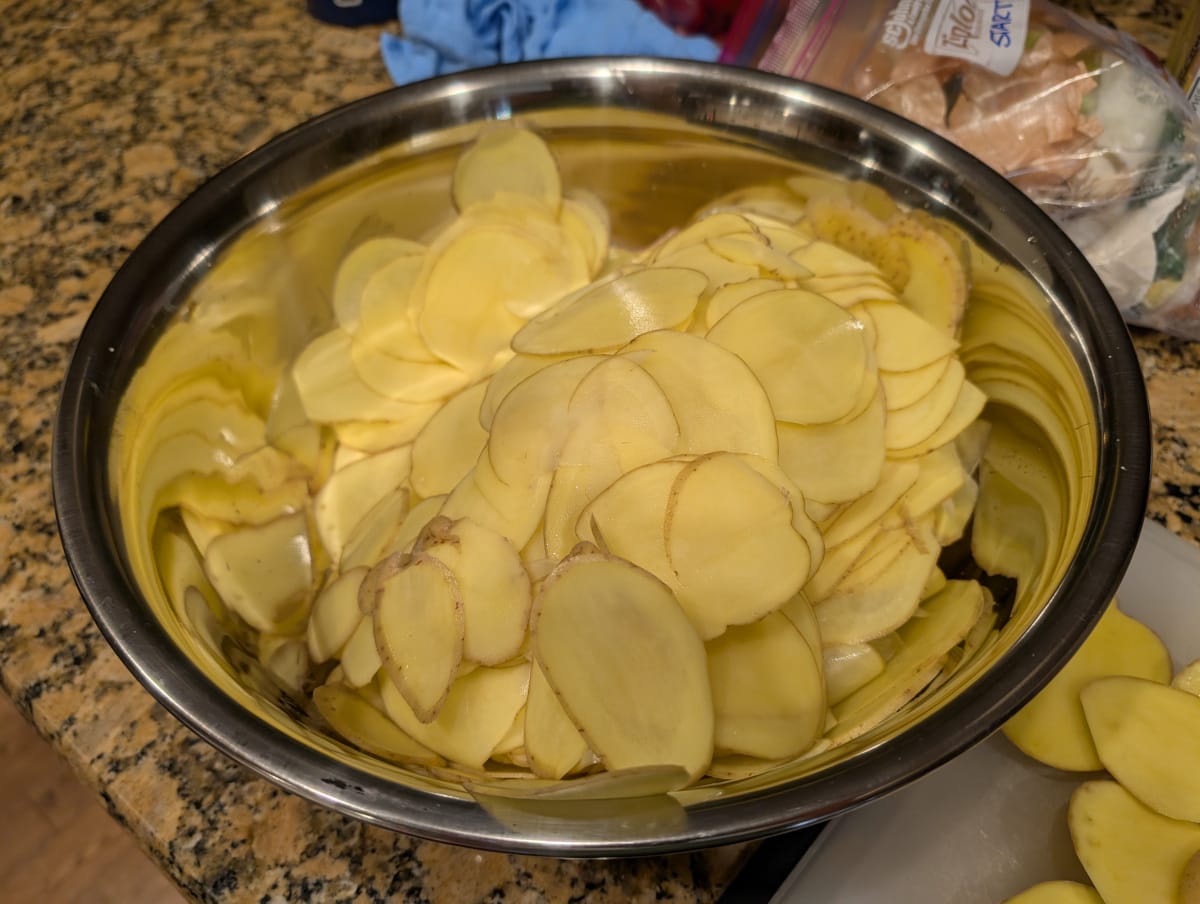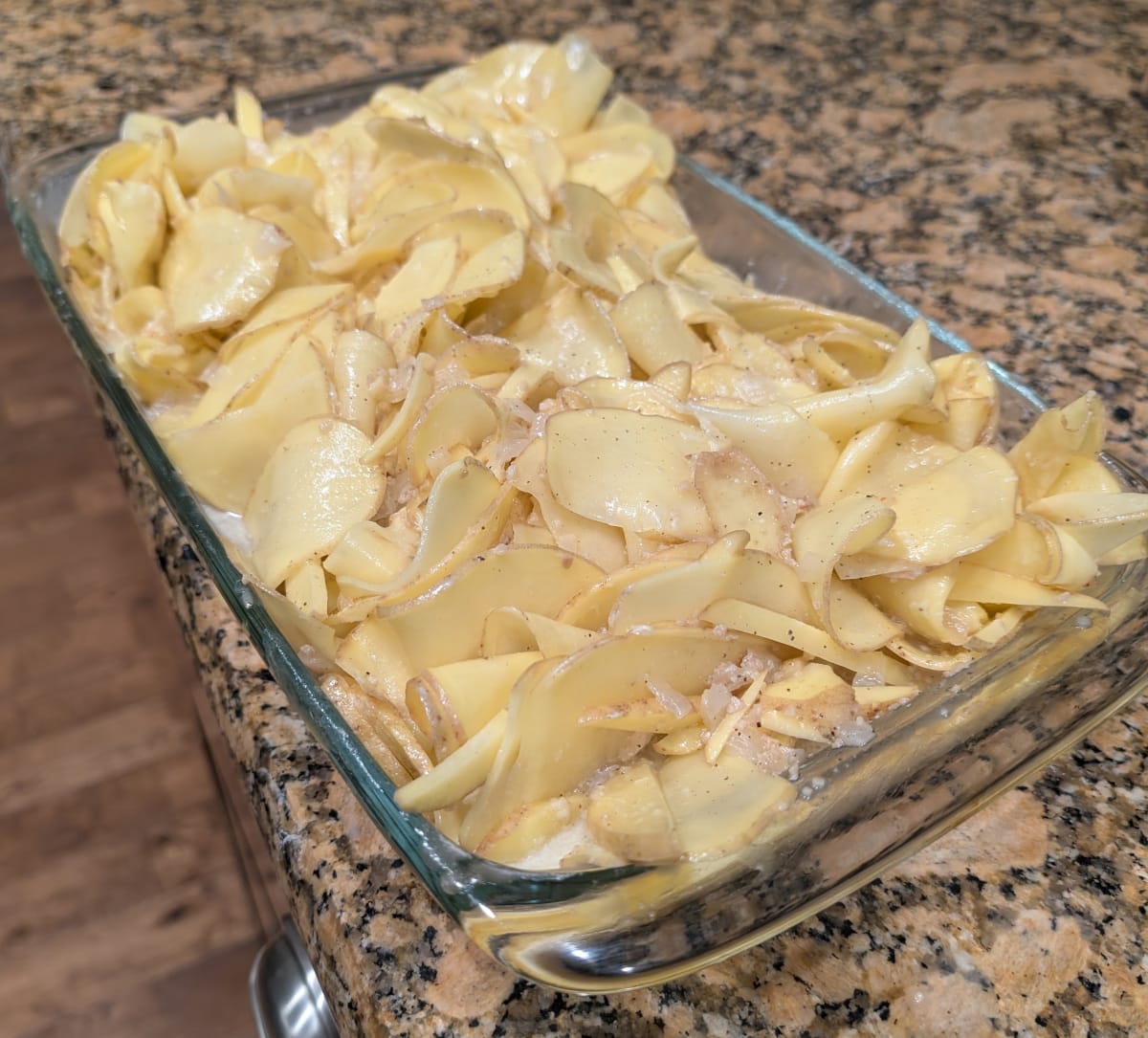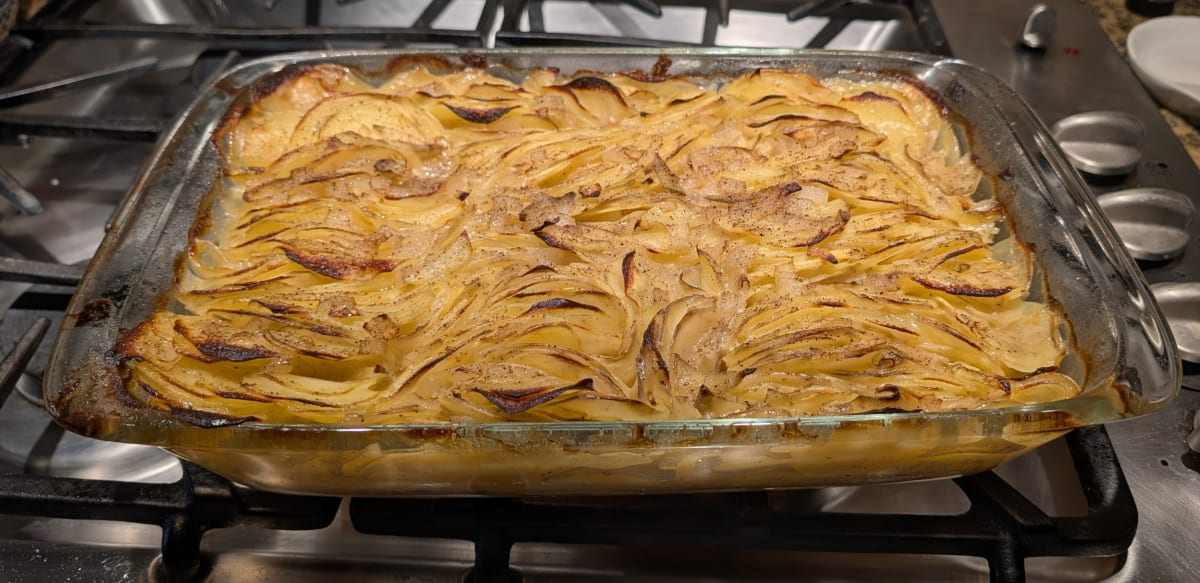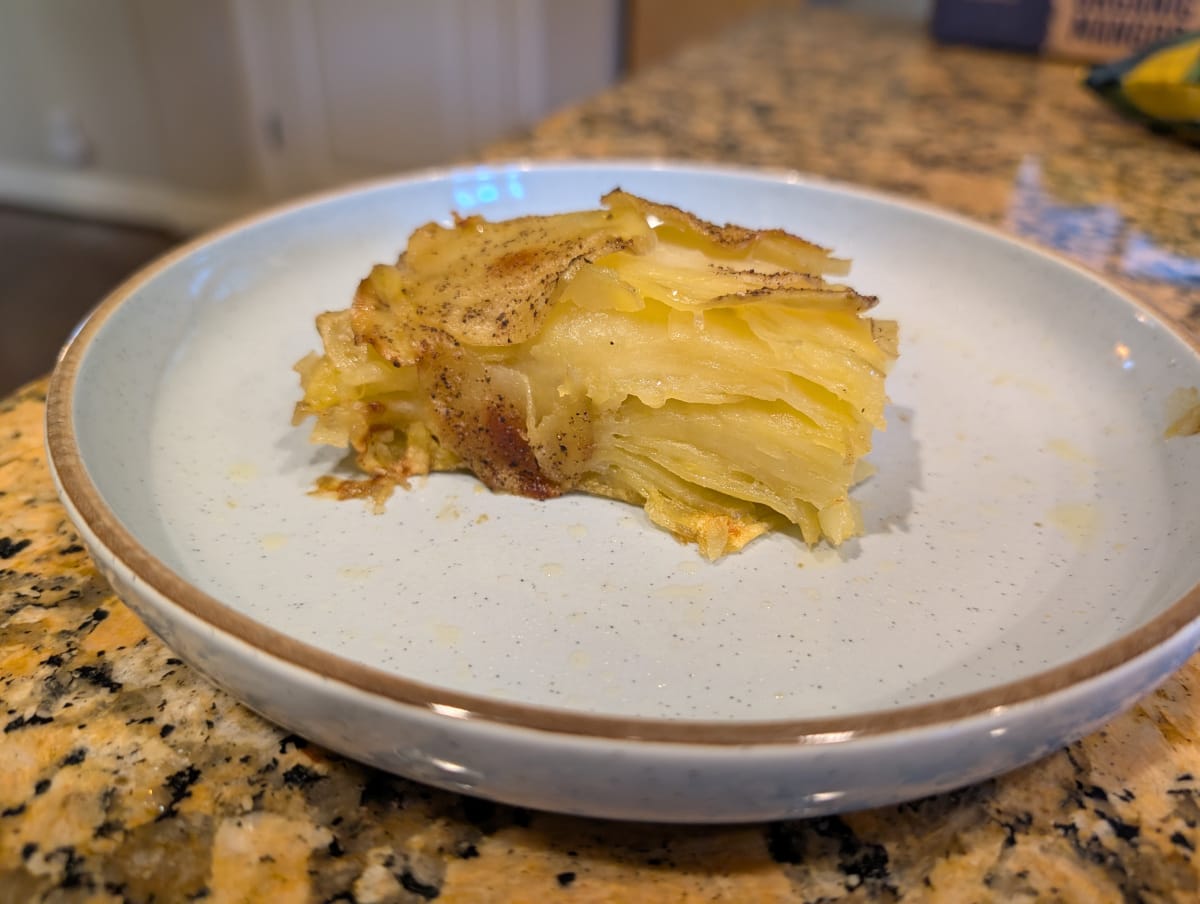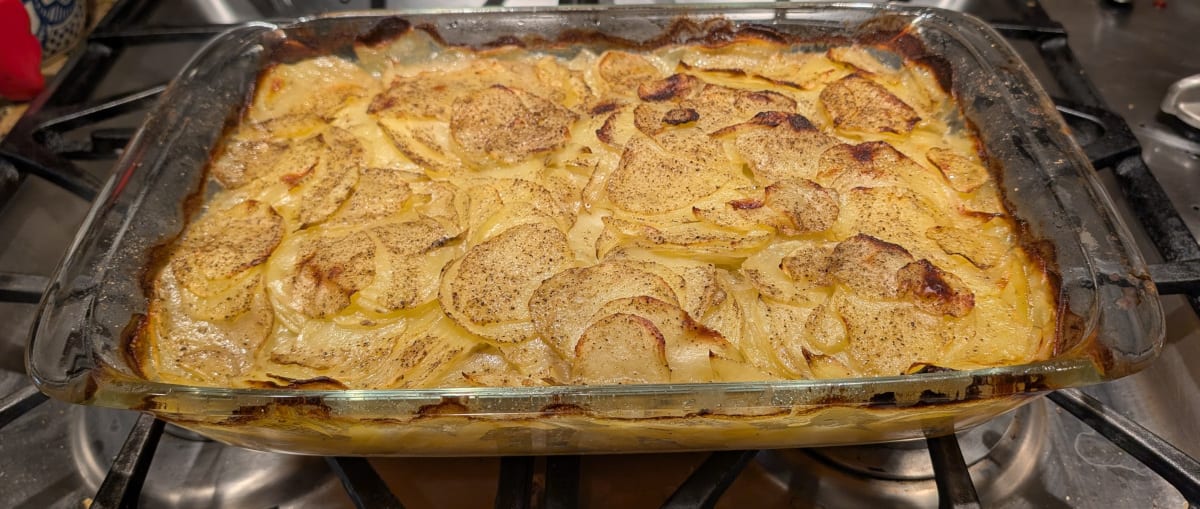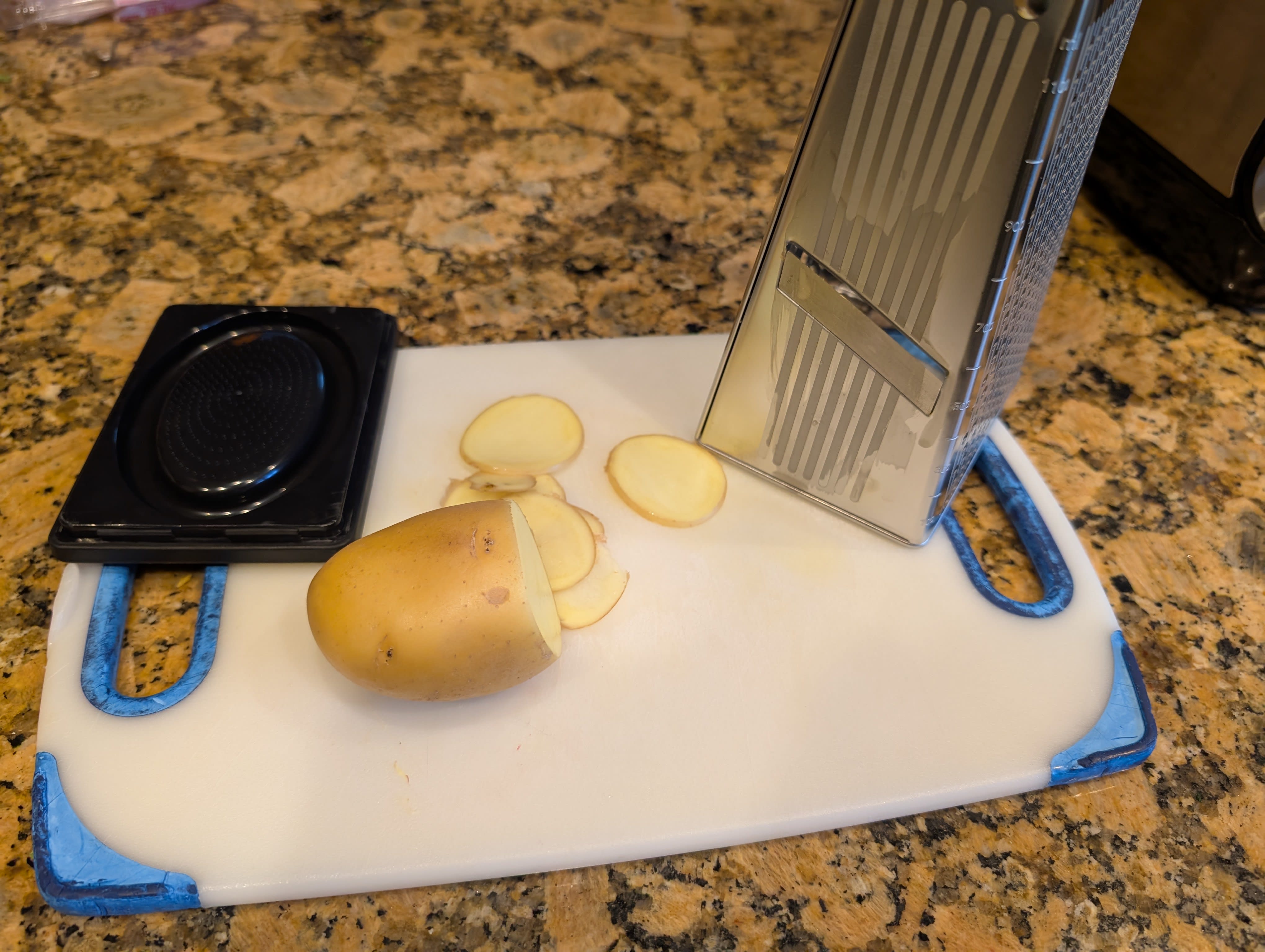Lazy Hasselback Pommes Anna
post by Brendan Long (korin43) · 2025-01-26T21:30:36.587Z · LW · GW · 19 commentsThis is a link post for https://www.brendanlong.com/lazy-hasselback-pommes-anna.html
Contents
Recipe Equipment Ingredients Directions Notes Variations None 19 comments
Do you have an insatiable hunger for potatoes? Do you have a fully-sated hunger for complicated recipes and having to cook all the time? This version of Pommes Anna, simplified and altered to an extent that will make French people cry, might be the recipe for you!
I try to eat unreasonable amounts of potatoes every day, so I want a food that doesn't take a lot of time to make, can be stored and reheated, and remains palatable after eating it for every meal for months at a time. The advantages of this recipe are:
- There's only 3 (required) ingredients.
- The crispy texture on top makes it more palatable long-term than mashed potatoes.
- The result can be reheated in a microwave in 2 minutes.
The main downsides are:
- It takes around an hour and a half to make (15-30 minutes of prep, 50 minutes of baking).
- You absolutely need a mandoline. Do not try to thinly slice 6 lbs of potatoes by hand.
Recipe
Prep Time: 15-30 minutes
Cook Time: 50 minutes
Servings: 8
Nutrition[1]:
- 3320 calories total (415 calories per serving)
- 7 g protein
- 12 g fat
- 72 g carbs
- Provides adequate amounts of most vitamins and minerals except for B12, Vitamin D, Vitamin E, Calcium, and Selenium.
If this is your whole diet, you may want to eat some eggs along with it.
Equipment
- 9x13 inch casserole dish
- Mandoline
Safety Note: Always use mandoline guard!
Ingredients
- 6 lbs Yukon Gold potatoes
- 1 tbsp table salt
- 1 stick (1/2 cup) butter
- Additional seasonings like garlic, pepper or thyme (optional)
Note: Recipe can be scaled to any baking dish. Fill dish with peeled potatoes to measure, then scale butter and salt proportionally.
Directions
1. Pre-heat oven to 400° F.
2. Peel the potatoes and then slice them thinly with a mandoline (I use the 2mm setting on mine). Cut any leftover potato pieces into thin strips. Add all of the potato to a very large bowl.
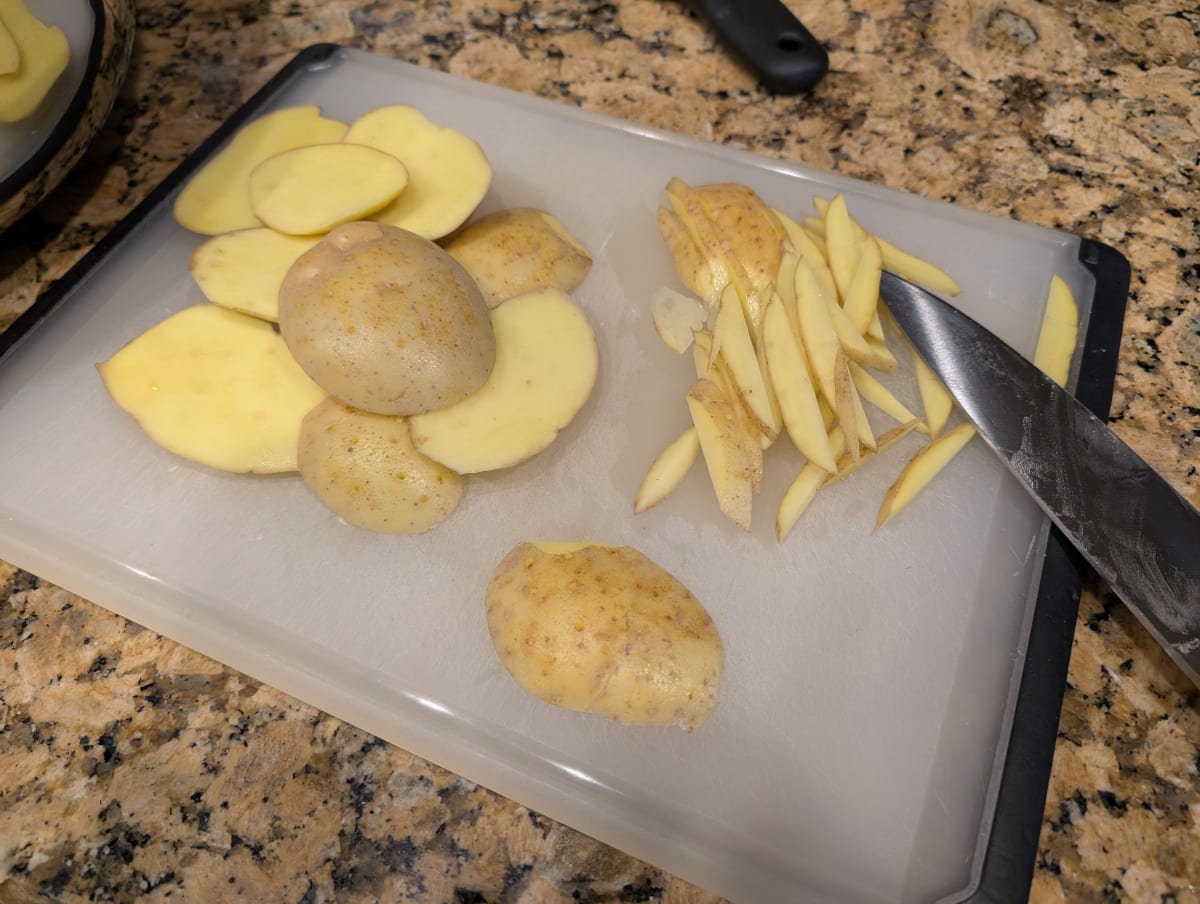
3. Melt the butter.
4. Add the butter, salt and any additional seasonings to the potato slices and mix it in.
5. Add mixture to the casserole dish. Placing the slices edge-up or randomly (my preference) will give you the most varied and crispy texture. Placing the slices flat will give you a more consistent custardy interior. Pour any additional liquid at the bottom of your bowl over the top.
6. Bake uncovered for 50 minutes.
7. Let cool and then slice and eat, or cool entirely in the fridge for solid pretty-looking slices that reheat in 2 minutes in the microwave.
Notes
- Don't skip peeling the potatoes. There's plenty of fiber on the inside of the potatoes and the skin is too much. It also contains most of the solanine, and if you're eating this quantity of potatoes it's worth avoiding. Some of my example photos demonstrate skin-on and the result was not very good.
- Add an additional tsp of salt if it doesn't taste good to you. I don't recommend reducing the salt unless you know you don't like salt. 1 tbsp for 6 lbs of potatoes is already on the low end of how people typically salt mashed potatoes.
- I use this mandoline (not an affiliate link) but I don't know anything about mandolines and this is the only one I've ever used, so maybe take advice from Serious Eats instead.
Variations
- If you salt the potatoes, wait 5 minutes, then press and drain them, then re-salt, the result will be more intensely flavored and less watery, but it's more work and likely makes this less effective as a diet food.
- Replace the butter with 1/2 cup of any oil suitable for baking. Light olive oils also work well, although I find the result less filling.
- You can probably reduce the oil and it will still cook acceptably, although the top will probably dry out rather than getting crispy, and it will get less palatable (in my opinion). Butter is only 1/4th of the calories (800/3300) so I don't think this is worth it.
- Try alternate potatoes if you want. The result with russets was crispier but didn't taste as good (in my opinion). Yukon Golds are objectively the best potato, but you do you.
- Dice 2 onions and sauté them in the butter before adding it to the potatoes.
- Place the slices flat if you want a more traditional custardy texture.
- ^
According to MacroFactor.
19 comments
Comments sorted by top scores.
comment by AnthonyC · 2025-01-27T13:03:32.030Z · LW(p) · GW(p)
Yukon Golds are objectively the best potato
Correct :-)
Do you have a specific type of gold you use? The best I can reliably get are the organic golds from Trader Joe's, they come in a 3 lb bag. When I'm making home fries or anything diced I also really like The Little Potato Company.
Edit to add: now you have me wanting to make potatoes au gratin. It's been a while since I've made a good cheese sauce.
Replies from: korin43↑ comment by Brendan Long (korin43) · 2025-01-27T17:50:28.563Z · LW(p) · GW(p)
I get the 10 lbs bags at Costco (usually buying 20 lbs at a time). Are the Trader Joe's ones noticably better tasting? I'd love to try more potato varieties but no one seems to sell anything more interesting unless I want tiny colorful potatoes that cost $10/lb.
Replies from: AnthonyC↑ comment by AnthonyC · 2025-01-27T21:41:40.974Z · LW(p) · GW(p)
Fair enough, I moved into a small space a few years ago and mostly buy smaller quantities now. I also like that the Little Potato Company's potatoes are already washed and I'm often boondocking/on a limited water supply.
Costco is generally above average in most things, so definitely a good choice. I find the brands I mentioned to be more consistently high quality across locations and over time, but not too much better at their respective bests. So when I need a specific meal to be high quality, like on holidays, I'll make sure to go to Trader Joe's.
FWIW the Trader Joe's organic golds are around $4/3lb bag. The Little Potato Company's bags are around $2-3/lb. I have bought both in at least 10 states each at this point and those price have been fairly consistent. I also don't want to spend a huge amount on potatoes.
comment by Said Achmiz (SaidAchmiz) · 2025-01-26T23:52:25.291Z · LW(p) · GW(p)
Question re: the mandoline: does the slicing side of this box grater look to be appropriate for slicing the potatoes for this recipe?
Replies from: korin43↑ comment by Brendan Long (korin43) · 2025-01-27T00:04:45.683Z · LW(p) · GW(p)
I actually have this exact box grater so I sacrificed a potato for science and determined:
- The thickness looks a little smaller than I usually do but should be fine.
- It's not quite as sharp as my mandoline so it might get tiring.
- The slicer is very small, so you might have trouble with large potatoes. I usually cut potatoes on the small side (for smaller slices) anyway, so this might not be a problem.
- You should get something to protect your hand since you'll definitely cut the tip of your finger off if you slice 6 lbs of potatoes like this without a guard.
comment by Adam Zerner (adamzerner) · 2025-01-26T23:07:19.273Z · LW(p) · GW(p)
One thing to keep in mind is that, from what I understand, ovens are very imprecise so you gotta exercise some judgement when using them. For example, even if you set your oven to 400°F, it might only reach 325°F. Especially if you open the oven to check on the food (that lets out a lot of heat).
I've also heard that when baking on sheet pans, you can get very different results based on how well seasoned your sheet pan is. That shouldn't affect this dish though since the intent is for the top to be the crispy part and that happens via convection rather than conduction. But maybe how high or low you place the baking dish in your oven will affect the crispiness.
Replies from: AnthonyC, korin43↑ comment by AnthonyC · 2025-01-27T13:16:03.057Z · LW(p) · GW(p)
I'm no chef, but I love to cook, and my thanksgiving meals are planned in spreadsheets with 10 minute increments of what goes where. Plus I currently live full-time in an RV so I've gotten used to improvising with nonstandard and less reliable tools. Take or leave my suggestions accordingly.
It's often a good idea, until and unless you know your oven really well, to put an oven thermometer in the oven on the rack and adjust accordingly. They're <$10. Try placing it in different spots and figure out how evenly or unevenly your oven heats, and how a pan in one spot affects temperature in another.
Composition and thickness of your pan also matters. Ovens heat from all sides, but it matters whether your food is sitting in glass, steel, thin aluminum, or thick aluminum. Cake mixes try to give different instructions for glass, metal, and dark metal, but it's going to vary by recipe.
And it matters whether you're using a convection or conventional oven. The standard advice is shorter times and lower temperatures for convection, but you might still get differences in terms of drying out the top before the bottom and center cook fully with convection. Maybe you have to cover it part of the time, for some recipes.
If you misjudge and want more crispiness, why not briefly broil at the end? Say you're trying to braise a roast in a pan next to, above, or below the dish of potatoes. Steam from the roast slows the cooking and prevents browning. Then when you take the roast out to rest, you have a couple of minutes to broil before serving.
↑ comment by Brendan Long (korin43) · 2025-01-26T23:12:29.025Z · LW(p) · GW(p)
That's a good point. I don't really know what I'm doing, so I'm not able to predict exact variations. I found that this worked relatively consistently no matter how I cooked it, but the version in the recipe above was the best.
I definitely endorse changing the recipe based on how it goes:
- If it's not crispy enough, bake it longer uncovered, or increase the temperature, or move the pan closer to the top of the oven.
- If the internal texture is crunchy/uncooked, bake it (covered) longer.
- If the internal texture is too mushy, bake it (covered) shorter. You could also make the inside crispier by discarding the liquid released when you salt the potatoes, but you'd also need to adjust the amount of salt to make it taste good, and it would effect how it cooks.
comment by Adam Zerner (adamzerner) · 2025-01-26T22:59:26.830Z · LW(p) · GW(p)
As another variation, I wonder how it'd come out if you used a sheet pan instead of a baking dish. I'd think that you'd get more crispy bits because of the increase in surface area of potato that is exposed to heat. Personally I'm a big fan of those crispy bits!
You'd probably need to use multiple sheet pans, but that doesn't seem like much of an inconvenience. You can also vary the crispiness by varying the amount of exposed surface area. Like, even if you use a sheet pan you can still kinda stack the potatoes on top of one another in order to reduce the exposed surface area.
Replies from: korin43↑ comment by Brendan Long (korin43) · 2025-01-26T23:17:14.335Z · LW(p) · GW(p)
I agree that more crispy bits is good. The recipe above optimizes for not being annoying to make, but doing the exact same thing and spreading the mixture on two sheet pans might work (and it would probably have a much shorter bake time).
I suspect the crispier version would be harder to store and wouldn't reheat as well though.
comment by Brendan Long (korin43) · 2025-03-04T20:13:29.456Z · LW(p) · GW(p)
I updated this after some more experimentation. I now bake them uncovered for 50 minutes rather than doing anything more complicated, and I added some explicit notes about additional seasonings. I also usually do a step where I salt and drain the potatoes, so I mentioned that in the variations.
comment by Said Achmiz (SaidAchmiz) · 2025-01-26T23:47:19.395Z · LW(p) · GW(p)
Yukon Golds are objectively the best potato
Not best for mashing, therefore not best for knishes, therefore not best!
(I agree that Yukon Golds are very good for many other applications, though.)
Replies from: AnthonyC↑ comment by AnthonyC · 2025-01-27T13:22:50.189Z · LW(p) · GW(p)
Interesting, why don't you like them for mashing? That's specifically what I like them best for. Although IIUC a knish needs a different texture to hold together well. I also don't use golds for (unbreaded) potato cakes unless I mash them in advance and use them left over.
Replies from: SaidAchmiz↑ comment by Said Achmiz (SaidAchmiz) · 2025-01-27T19:53:22.111Z · LW(p) · GW(p)
Starchy potatoes are best for mashing, I find, texture-wise. (So, your standard russet potato.) Yukon Golds are more waxy.
Replies from: AnthonyC↑ comment by AnthonyC · 2025-01-27T21:33:10.973Z · LW(p) · GW(p)
In my experience that's true for a hand-held masher or hand mixer, but if I'm slow-whipping in a stand mixer with butter and cream, golds give a fluffier, smoother, lighter result.
Replies from: korin43↑ comment by Brendan Long (korin43) · 2025-01-27T21:44:48.150Z · LW(p) · GW(p)
I also like Yukon Golds best in mashed potatoes, but I use a ricer (similar to this one).
Replies from: AnthonyC↑ comment by AnthonyC · 2025-01-27T21:48:40.231Z · LW(p) · GW(p)
I used to use a ricer, but found that it always made the potatoes too cold by the time I ate them. Do you find this? If not, do you (even if you never thought of it this way) do anything specific to prevent it? If so, do you then reheat them, and how?
With a stand mixer and the whisk attachment I found removing the ricer step hasn't really mattered, but any other whipping method and yeah, it's very useful.
Replies from: korin43↑ comment by Brendan Long (korin43) · 2025-01-27T22:37:02.556Z · LW(p) · GW(p)
I rice my potatoes while they're still burning hot, which is annoying, but I'm impatient and it means the result is still warm. If you're (reasonably) waiting for the potatoes to cool down, you might be able to re-heat them in the microwave or on the stove without too much of a change to texture, although you'd have to be careful about how you stir it.
Doesn't the stand mixer method overmix and produce glue-y mashed potatoes? I actually don't mind that texture but I thought that's why people don't usually do it that way.
Replies from: AnthonyC↑ comment by AnthonyC · 2025-01-27T22:44:58.921Z · LW(p) · GW(p)
You would think so, I certainly used to think so, but somehow it doesn't seem to work that way in practice. That's usually the step where my wife does the seasoning and adds the liquids, so IDK if there is something specific she does that makes it work. But I'm definitely whipping them with the whisk attachment, which incorporates air, and not beating them with a paddle attachment. I suspect that's the majority of why it works.
